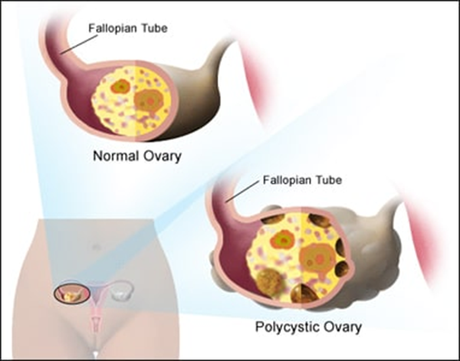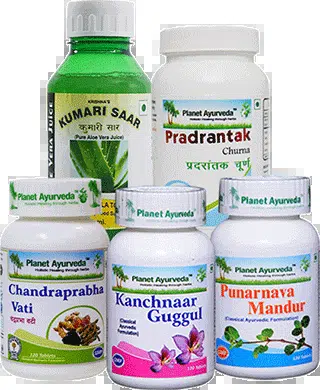ABSTRACT
We all are only one spay away to smell good. Aren't you drawn to the fragrances from different luxurious perfumes but do you know what's in it? Bisphenol A (BPA), Phthalates, Triclosan (TCS), and Pesticides accompanied by industrial chemicals are some of the chemicals found in perfumes. These all are enough to disrupt your endocrine levels ultimately producing Xenoestrogens and inviting PCOD. So, many of you are aware of what is the secret behind that fragrance. But do you know what are Xenoestrogens? These are compounds whose molecular structure is similar to oestrogen. They mimic the activity of oestrogen. They are none other than BPA, PCBs, Dioxin, and Phthalates, a class of chemicals found in perfumes also known as xenoestrogens. They cause hormonal imbalances and oestrogen dominance in both males and females.

INTRODUCTION
Xenoestrogens are divided into Natural Xenoestrogens (obtained from fungi and plants ) also called phytoestrogens and Synthetic Xenoestrogens (obtained from drugs, cosmetics, perfumes, and industrial products). Phytoestrogens are beneficial for health whereas xenoestrogens are detrimental for health. Xenoestrogens in perfumes lead to increased production of oestrogen also known as oestrogen dominance. It causes hormonal imbalance and leads to PCOD. Polycystic Ovarian Disease (PCOD) is the most common hormonal issue among women. Women having more than 20 or more follicles in at least one ovary are said to have PCOD. PCOD is a gynaecological endocrinopathy in adult women.
1 out of 10 adult women is diagnosed with PCOD. A sedentary lifestyle, pollution, cosmetics, and dietary habits have worsened the endocrine functioning in women. Women with PCOD are at increased risk of infertility, endometriosis, and endometrial cancer. So, PCOD should be treated seriously and Ayurveda provides the best alternative to treat PCOD.
CAUSES OF PCOD
- Use of industrial products like pesticides
- Cosmetics Perfumes
- Dioxin-containing sanitary pads
- Heredity
- Oestrogen dominance
- Insulin resistance
- Androgen dominance
- Inflammation
SYMPTOMS
- Irregular periods or no periods
- Heavy bleeding
- Weight gain/central obesity
- Pelvic pain
- Excess Hair growth on the face, chest, and back (Hirsutism)
- Thinning of hair
- Acne/oily skin/dry skin
- Hair loss / Male pattern baldness
- Darkening or black discoloration of the skin
- Thick skin patches in armpits, under the breast, and on the back of the neck.
- Skin tags/presence of excess skin on neck or armpits.
- Reduced breast size
- Deep voice
- High blood pressure
- Infertility
DIAGNOSIS
Based on your medical history and your symptoms the health care provider will do a physical exam and a few investigations to rule out PCOD.
PELVIC EXAM
Your healthcare provider will insert two fingers inside your vagina and palpate your abdomen to feel your ovaries. It is done in order to check inflammation or swelling in your ovaries.
ULTRASOUND
This test uses ultrasound waves to form an image of vessels, and organs on the computer to rule out inflammation and abnormal follicles in the ovary.
BLOOD TEST
Blood tests are done in order to check high levels of androgen, oestrogen, and other hormones. It is also done to check the increased level of luteinizing hormone which causes infertility.
You may also be checked for insulin levels along with cholesterol and triglyceride levels.
AYURVEDIC OVERVIEW
As per the Ayurvedic point of view, PCOD is correlated with Aarthava Kshaya. It is a disorder of Artava vaha strotas (channels). In this disorder, Kapha blocks the Artava vaha strotas (channels) and interrupts the movement of Apana-Vata and Pitta. Various acharyas describe that vata imbalance leads to pelvic pain. Accumulation of toxins in rasa and rakta dhatu causes multiple cysts. The patient is presented with delayed, scanty periods which do not last for 3 days or no periods accompanied by pelvic pain. Artava kshaya should be treated by the use of channels purifying substances and agneya substances.
PCOD AND INFERTILITY
Decoding PCOD and Infertility is of major concern. PCOD can cause infertility in many women of reproductive age. If you have PCOD your ovaries will produce abnormally higher amounts of estrogen and ultimately cause higher production of LH by the pituitary gland into the bloodstream disrupting your normal menstrual cycle. Your follicles do not mature and ovulation does not occur leading to infertility. In addition, Insulin levels are increased in the blood. Too much insulin combined with excess LH leads to excess production of the male hormone ie. testosterone which also prevents ovulation and results in male-like characteristics and infertility.
HERBAL REMEDIES FOR PCOD BY PLANET AYURVEDA
Planet Ayurveda provides the best combination of effective herbal remedies as an Anti-Ovarian cyst pack for the treatment of Polycystic ovarian disease (PCOD). It is a polyherbal pack that contains etc. For natural and herbal treatment always look for natural products which contain pure extracts and are formulated under GMP guidelines. Planet Ayurveda products are scientific and certified. They are free from any chemicals, additives and preservatives. Products of planet ayurveda are formulated by MD Doctors and are 100% natural, pure, and free from side effects.
Product List
- Pradrantak Churna
- Chandraprabha Vati
- Kanchnaar Guggul
- Punarnava Mandur
- Kumari Saar


PRODUCT DESCRIPTION
1. PRADRANTAK CHURNA
Pradrantak churna is a wonderful herbal formulation that contains Lodra (Symplocos racemosa), Ashoka (Saraca indica), Udumbar (Ficus glomerata), Arjuna (Terminalia arjuna). This medication is useful in treating painful periods. This formulation is effective in normalising the menstrual cycle and balances hormonal abnormality.
Dosage: 1 teaspoonful, twice daily with warm water after meals.
2. CHANDRAPRABHA VATI
ChandraPrabha Vati is a herbal formulation that contains Shilajit(Asphaltum), Guggul (Commiphora mukul), Shankara (Sugar), Karpoor (Cinnamomum camphora), Vacha (Acorus calamus), Mustak (Cyperus rotundus) etc. This formulation balances kapha and increases digestive fire . Thereby normalising aggravated vata and relieving pelvic pain.
Dosage: 2 tablets, twice daily with warm water after meals.
3. KANCHNAAR GUGGUL
Kanchnaar guggul is an effective herbal formulation that contains Kachnar bark (Bauhinia variegata), Amalaki (Emblica officinalis), Haritaki (Terminalia chebula), Bibhitaki (Terminalia bellerica), Ela (Elettaria cardamomum) etc. It balances tri dosha (vata, pitta, Kapha). It is useful in treating PCOD associated with thyroid disorders. It also reduces cholesterol and triglyceride levels.
Dosage: 2 tablets, twice daily with warm water after meals.
4. PUNARNAVA MANDUR
Punarnava Mandur is a herbal formulation that contains Punarnava (Boerhaavia diffusa), Shunti (Zingiber officinale), Mandoor Bhasma (Ferric oxide calx) etc. Punarnava mandoor is classically used for anaemia and blood disorders. It is useful in regularising ovulation and menstrual cycle and reducing the size of the cyst.
Dosage:2 tablets twice daily with warm water after meals.
5. KUMARI SAAR
Kumari Saar is a herbal formulation that contains kumari (Aloe vera). Kumari also known as Ghrita kumari is useful in maintaining normal oestrogen and progesterone levels. Phytochemicals of aloe vera help in insulin metabolism.
Dosage: 2 tsp twice daily with plain water after meals.
Contact Planet Ayurveda Support Team to provide you the costing / ordering and delivery information at - [email protected] or Call at 0172-521-4030 (India), +91-172-521-4030 (Outside India) or Whatsapp at (+91) 9915-593-604CONCLUSION
Alternative treatment for PCOD can help in treating PCOD and reducing the symptoms of PCOD. Usage of perfumes, harmful cosmetics, and industrial chemicals should be reduced so that unwanted xenoestrogens should not enter our bodies thereby disrupting the endocrine functioning of women. Precautionary measures followed with good Ayurvedic herbal formulation can help in giving good results in PCOD.

